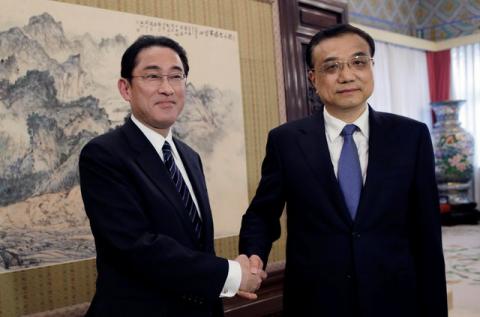Advertisement
China, Japan more upbeat on ties but challenges remain
BEIJING (Reuters) - China and Japan both expressed a willingness to improve strained relations on Saturday after a rare meeting between their two foreign ministers in Beijing, though China said Japan should stop pushing the notion that China is a threat.
China, the world's second-largest economy, and Japan, the third-largest, have a difficult political history, with ties strained by the legacy of Japan's World War II aggression and conflicting claims over a group of uninhabited East China Sea islets.
Relations have been thawing recently, with meetings between Chinese President Xi Jinping and Japanese Prime Minister Shinzo Abe, but Beijing remains deeply suspicious of Japan, particularly of moves by Abe to allow the military the right to fight overseas for the first time since the war.
Meeting at a state guest house, Chinese Foreign Minister Wang Yi told Japanese Foreign Minister Fumio Kishida ties had fallen to a low ebb.
"We have recently seen the Japanese side repeatedly expressing its hope of improving the bilateral relationship. You have also shown your willingness to take the first step. If you come with sincerity, we welcome you," Wang said.
"As the Chinese saying goes, we should make a judgment based on not only what people say but also what they do," he added, at the start of the first bilateral visit by a Japanese foreign minister to China in more than four years.
"Facing up to history, abiding by promises and cooperation rather than confrontation should be the basis of China-Japan relations."
Kishida, speaking later to Japanese reporters, said there had been a "frank exchange of views" in what he called an extremely significant visit.
"At this meeting we confirmed the importance of Sino-Japanese relations and agreed that both sides would strive for further improvement in ties," he said, according to Japan's NHK broadcaster.
China's Foreign Ministry said Wang made suggestions for how to improve relations, using forceful language that underscores the suspicion in Beijing about Tokyo.
Japan "should have a more positive and healthy attitude toward the growth of China, and stop spreading or echoing all kinds of 'China threat' or 'China economic recession' theories", the ministry said in a statement.
(Additional reporting by Linda Sieg in Tokyo; Editing by Kim Coghill)



















Add new comment